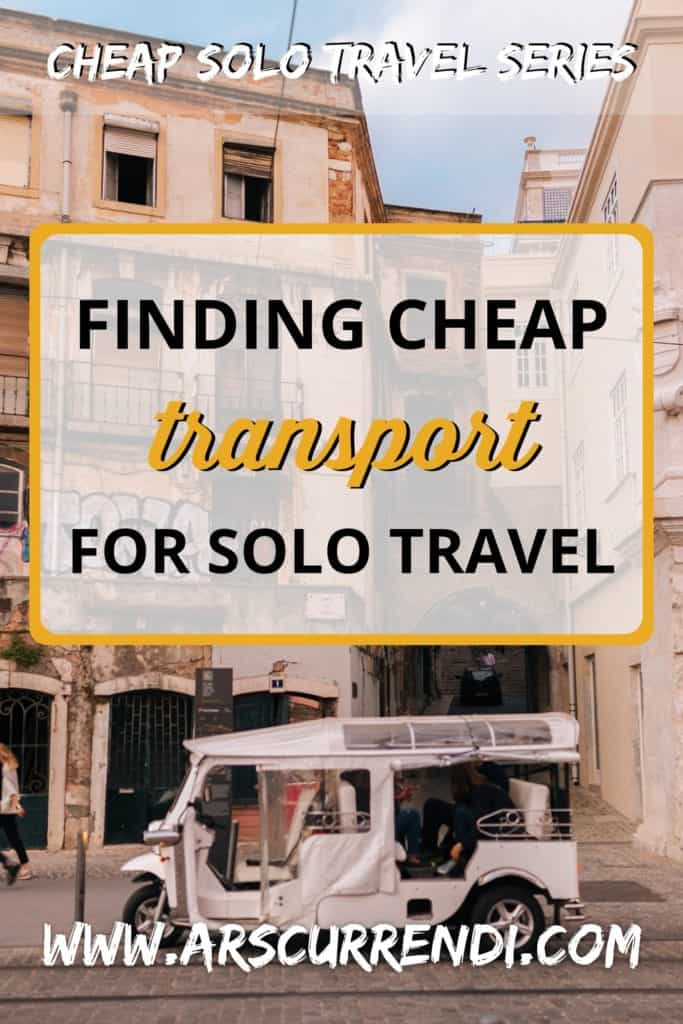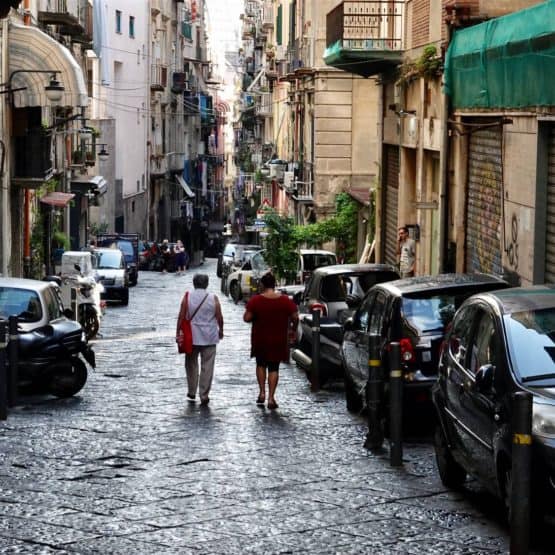Finding cheap transport while travelling solo can be more challenging than it would be if you were travelling with other people. If you use these tips, however, you’ll be sure to find those cheap flights and other modes of transport you’ve been looking for.
Note: this blog post uses insights from my ebook “The Insider’s Guide to Solo Travel on a Budget“, where I teach everyone how to be a better solo traveller and spend less money on the road.
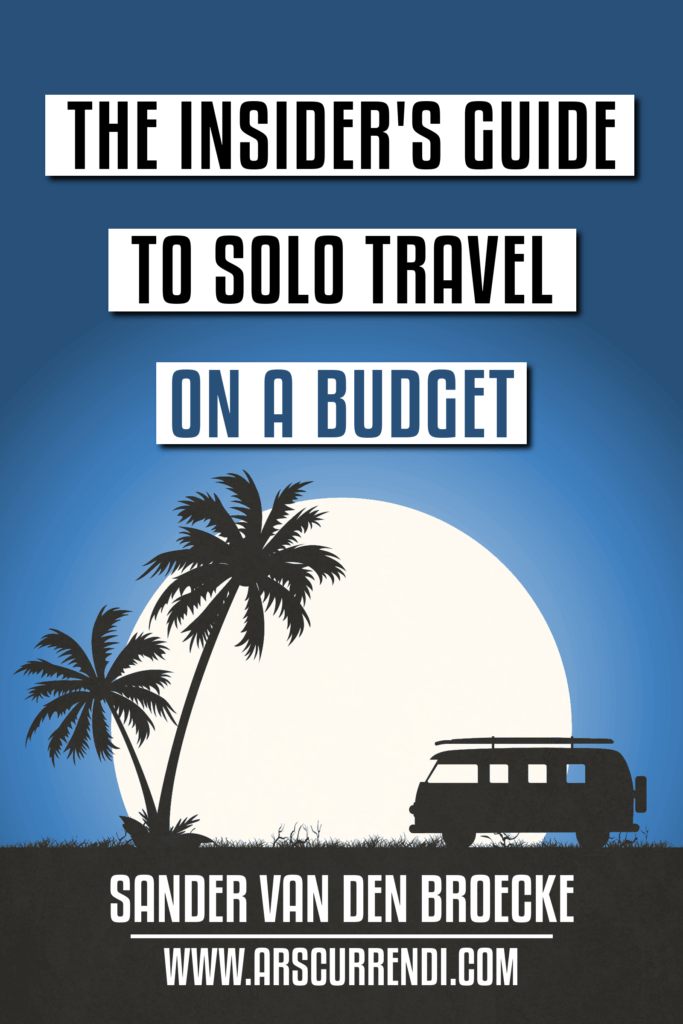
This blog post is the second in a miniseries of three dedicated to cheap solo travel. You can also learn how to find cheap accommodation or cheap food and drinks while travelling solo. I created this series to help you travel by yourself and spend less while doing so. It uses things I learned myself during my solo trips and tells you things I wish I had known when I started travelling alone.
The importance of finding cheap transport
One of the most expensive parts of many trips is the flight. Everyone that wants to travel has to spend money on transport, but it doesn’t have to be as expensive as you think.
There are many ways in which you can save money on transport, which just means that you get to spend that money on other parts of your trip, like accommodation or food.
The majority of this post will discuss how to find cheap flights because that’s the biggest cost in most cases. It will also include information on how to find cheap buses and trains, and solo alternatives for rental cars (which tend to be very expensive for solo travellers).
Cheap flights
Many travel experts have their own tips and tricks for finding cheap flights. Everyone has a favourite flight metasearch engine, and there are so many that finding cheap flights nowadays is really not as difficult as you may think. I’ll help you with it.
I’ll divide these tips into two main categories, both filled with extensive knowledge and subcategories:
- Comparing flight websites (also known as metasearch engines)
- Other tips to find cheap flights
Metasearch engines
You’ve probably already used one (or more) of these flight search websites while looking for a flight. On one page, they conveniently list the results from dozens, if not hundreds, of airline websites. They scour through these websites, looking for the best offers in a matter of seconds.
Nowadays, there are plenty of flight metasearch engines to search from. There are so many that it may be hard to know where you should start. All of these websites have advantages and disadvantages, which is why you shouldn’t perform all of your searches on just one website.
In this section, I’ll give you an overview of my personal favourite flight search websites, along with their (dis)advantages and why I use them. These are listed in bullet points for your convenience, so you can quickly scan through them.
1. Google Flights
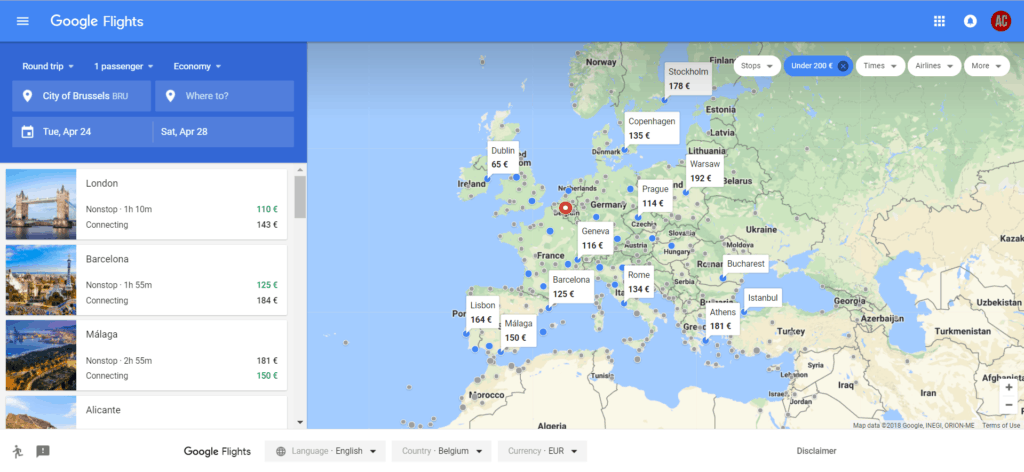
- Advantages:
- The site doesn’t reload when you make changes to your query, which gives you surprisingly fast loading times.
- You can filter by specific airline/airline alliance.
- The mobile version of the web page is very accessible and responsive.
- Disadvantages:
- You can’t book through Google Flights directly.
- You can’t search for flexible dates, but you can easily see which days of the month are the cheapest by clicking the date when you have a set destination.
- Why should you use Google Flights?
- You can enter your takeoff airport of choice and see all possible destinations on the map at a glance. After filtering for the price (e.g. all flights below $200), you can easily see where cheap flights will take you.
2. Skyscanner
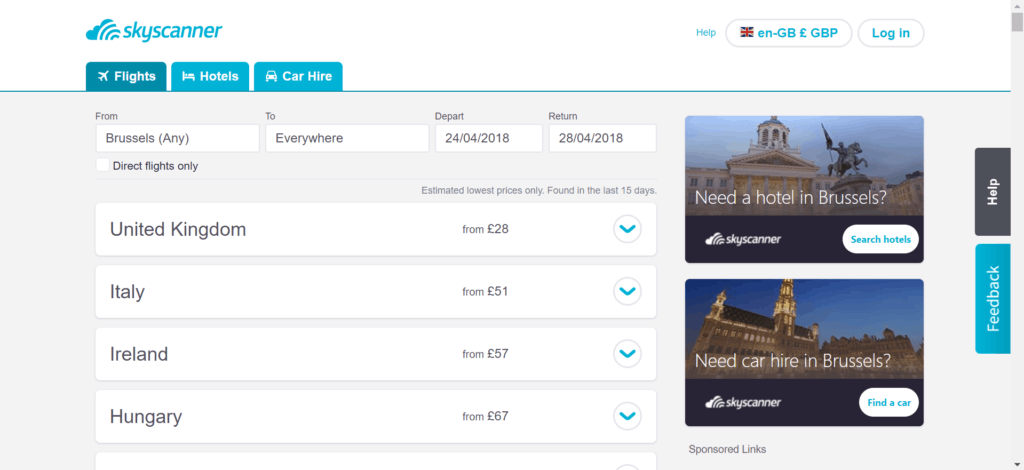
- Advantages:
- Skyscanner has a comprehensive network of airlines and travel agents, giving you a good chance of finding a cheap flight here.
- It’s not necessary to enter specific dates. You can search for entire months or even let the engine find the cheapest month of the year for you.
- You can add nearby airports for potentially cheaper flights.
- Disadvantages:
- Skyscanner isn’t very transparent about their pricing and sometimes adds hidden fees after you click on the flight you want to book.
- Their engine tends to get beaten by other search engines, such as Kayak and Momondo.
- You can’t book through Skyscanner directly.
- Why should you use Skyscanner?
- If you don’t have any idea where you want to go and when you should go, Skyscanner can give you an accurate indication of where cheap flights are going all year round. However, you should definitely include other search engines into your search for cheap flights.
3. Cheapflights
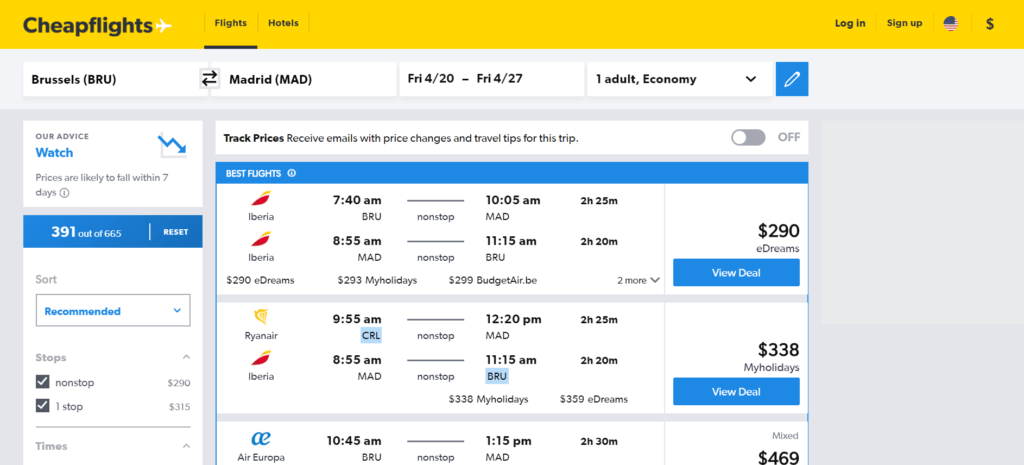
- Advantages:
- Cheapflights allows you to search for nearby airports.
- You can set up price trackers, that will email you when prices drop for the flights you’re looking for.
- “Our advice”: for every search query, Cheapflights gives their opinion on what you should do, advising you whether you should buy tickets now or wait.
- You can search for multi-city trips.
- Disadvantages:
- You have to enter a specific destination. In other words, you can’t search for flights “anywhere”.
- The website loads slowly.
- The multi-city search option doesn’t allow you to search for flexible dates.
- Why should you use Cheapflights?
- Cheapflights includes search results from their partners (including British Airways, JetBlue and Expedia) which don’t appear in every flight search engine.
4. Kayak
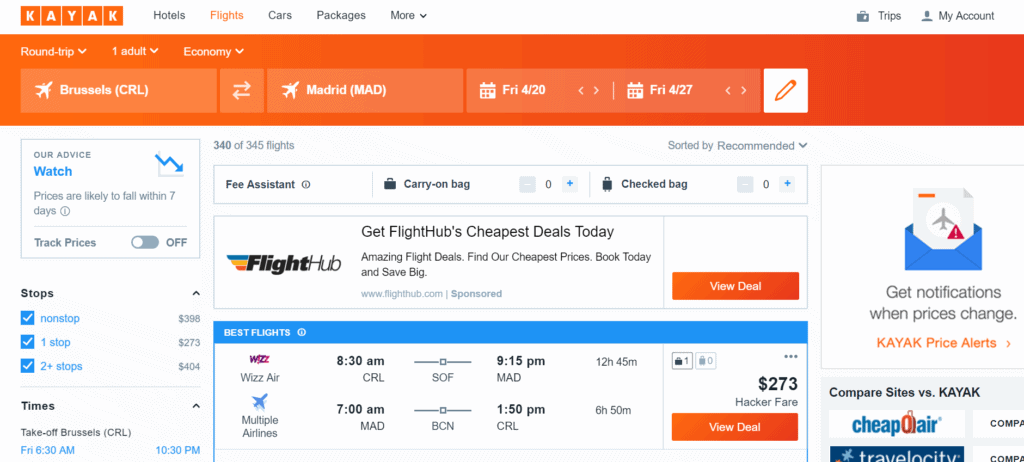
- Advantages:
- The website and app are fast and well-designed.
- Kayak offers package deals if you book any combination of flight, hotel and rental car through their website.
- You can set up price alerts that will email you when the price of the flight that you are interested in changes.
- You can look for flights “anywhere”.
- The Kayak algorithm includes hacker fares.
- The Kayak Explore tool is very useful for finding cheap flights if you don’t know where and when you want to go.
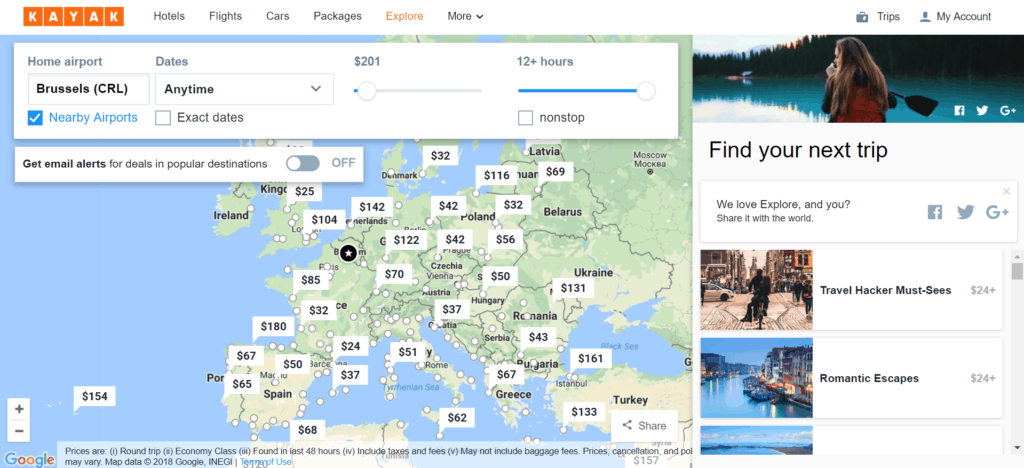
- Disadvantages:
- The support staff at Kayak seems to be either incompetent or unexisting.
- The website displays a lot of advertisements and a pop-up is generated when you enter search parameters.
- Why should you use Kayak?
- It’s very easy to find cheap flights in the well-designed online environment of Kayak and they’re very transparent about their pricing (what you see is what you get).
5. Momondo
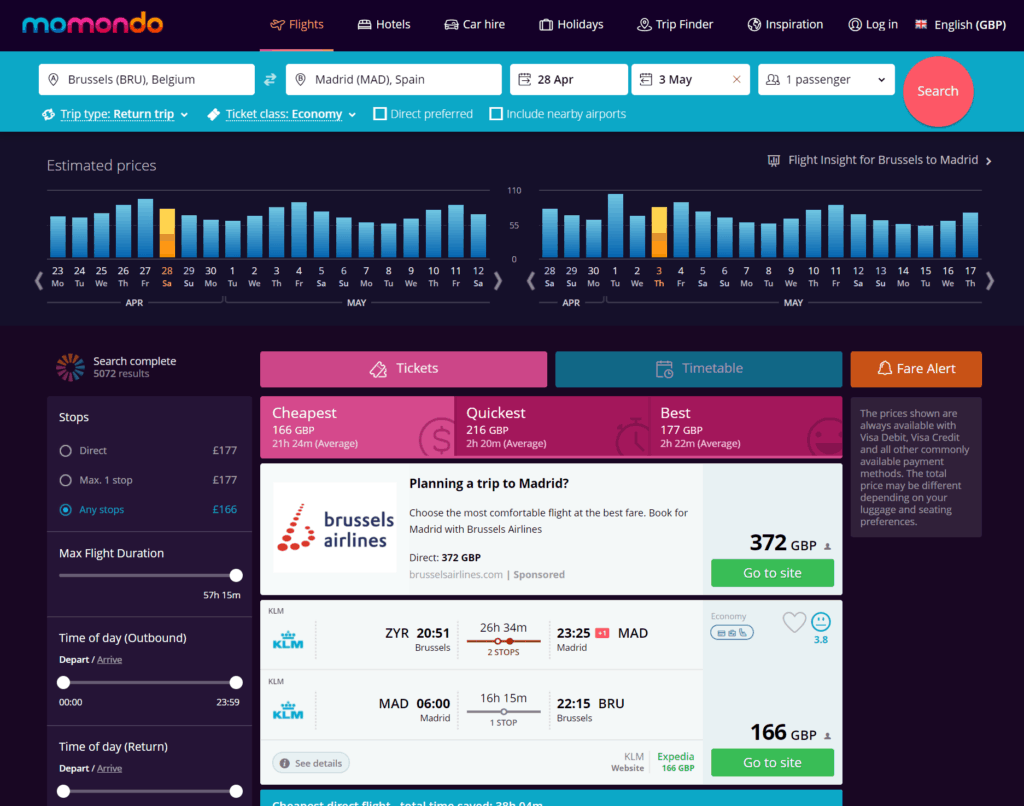
- Advantages:
- Momondo has a very colourful, aesthetically pleasing interface that can show you the flights you’re looking for on other days, which may be cheaper.
- You get “Cheapest”, “Quickest” and “Best” (best balance between price and flight time) options.
- Momondo uses its screen display perfectly to give you all the information you might need about your flights.
- Flight Insights: Momondo offers useful insights into the history of the prices of your flight.
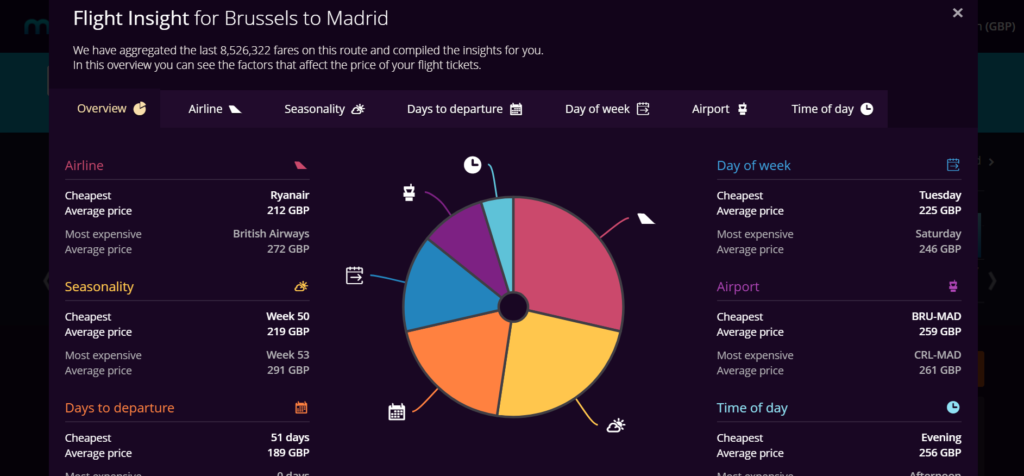
- Disadvantages:
- You can’t book through Momondo directly.
- Momondo is not a great engine for complex trips with multiple cities.
- Why should you use Momondo?
- This engine has often been named one of the best in the business. It’s sleek, intuitive and it has lots of features, but it’s still easy to find cheap flights.
6. Skiplagged
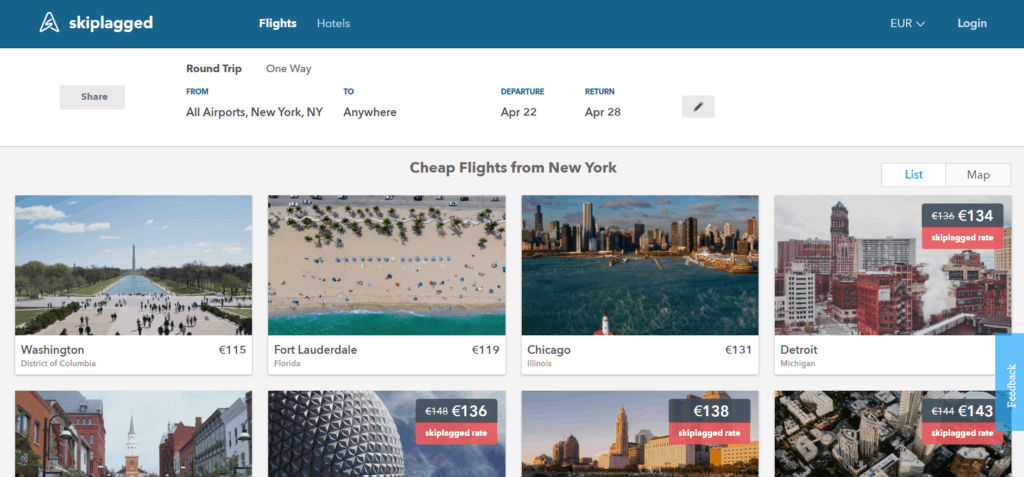
- Advantages:
- Skiplagged displays “hidden-city” flights. These are flights where you book a flight with a layover, but get off at the layover airport instead of flying to the final destination.
- The interface is clean, minimalistic and easy to navigate.
- If you don’t want to book a hidden-city flight, you can still find other cheap flights on Skiplagged. The difference between the two is marked clearly.
- Skiplagged has a very visual presentation of the possible destinations.
- Disadvantages:
- Hidden city ticketing is legal, but it’s frowned upon. It often goes against the terms and conditions of airlines and they can (and will) punish you if they catch you.
- With a hidden city ticket, you can’t have checked baggage. You’ll have to make do with your cabin baggage.
- There is no option for flexible dates or nearby airports.
- Why should you use Skiplagged?
- If you’re looking to save big at the risk of not getting a ticket at all or getting caught and punished, Skiplagged is the website for you.
7. Cheapflightsfinder
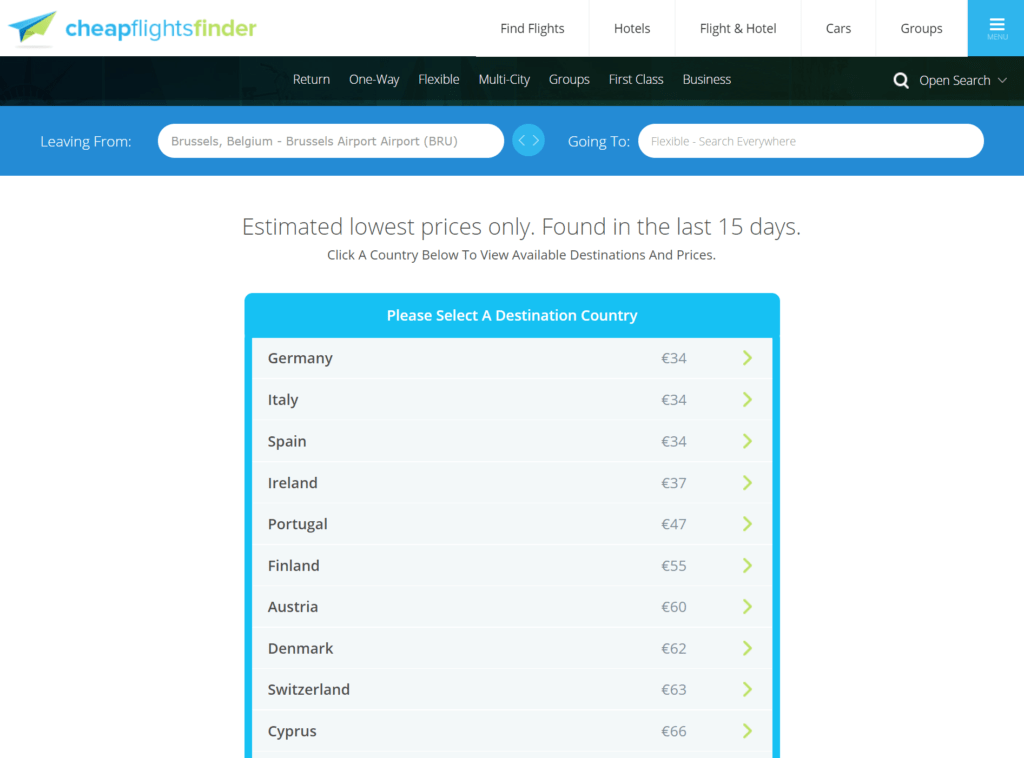
- Advantages:
- You can search for flexible dates (+- 3 days, whole month or whole year).
- Cheapflightsfinder is a meta-meta search engine that compares the results of different metasearch engines.
- The website design is intuitive and simple.
- Disadvantages:
- The interface for multi-city flight searches doesn’t display correctly on some monitors.
- You can’t search for flexible dates for multi-city flights.
- You can’t book through Cheapflightsfinder directly.
- Why should you use Cheapflightsfinder?
- Cheapflightsfinder quickly and efficiently compares data from many different sources, which almost guarantees that it will display the cheapest option for you.
Miscellaneous tips for cheap flights
Of course, there are other ways to find cheap flights than to scour metasearch engines in search of the best deals. Here are some more tips.
Error fares
Being one of the busiest industries in the world, the travel sector is bound to make some mistakes. These mistakes don’t always mean that your flight gets delayed or cancelled. In fact, you might even get a cheaper flight out of them.
An error fare is a flight for which incorrect information was entered into the system. For example, an employee can forget to take fuel costs into account, use an incorrect currency or forget a zero at the end of the price tag. In other words, error fares always come from human mistakes.
There are some things you should keep in mind when you’re considering booking an error fare.
- Error fares don’t give you, as a passenger, any rights. It’s just sheer luck that you managed to come across them.
———— - The smaller the error is, the more likely the airline is to honour the error fare. (e.g. you’re more likely to get a flight for $100 instead of $110 than a flight for $100 instead of $300)
———— - Don’t book anything that depends on the flight (accommodation, rental car, etc.) before you know for sure that the airline is going to honour the fare.
———— - Don’t contact the airline about your error fare. That’s only going to shift attention toward it and make it more likely to be fixed.
———— - Be cautious when booking an error fare and be prepared for the possibility that you may not get the ticket at a lowered price.
If you’ve considered all of the above, and you still want to find error fares, go for it. In that case, here are some websites that often post about error fares. I recommend subscribing to their mailing lists to make sure that you never miss one. (Cheap Flights Lab, Secret Flying, Fly4Free, Airfare Watchdog)
Incognito mode
This is arguably the most famous trick for people trying to find cheap flights. If you’re browsing through airline websites or metasearch engines, make sure you do it in incognito mode. (Control/Command + Shift + N on Google Chrome, Control/Command + Shift + P on Firefox, Command + Shift + N on Safari)
You’ve probably been there. You’re looking for a flight to your dream destination, and you check some websites every day. However, after two or three days, you find out that the prices are going up.
“Well, yes, but how can an incognito window help me with this?”
These websites use files called cookies against you. They know your browsing history, and when they see that you repeatedly look at the same flights, they will increase their prices. This way, they make it seem like seats are selling out and you should book sooner rather than later if you still want to be on the plane. In reality, this is not happening.
If you use an incognito window – which doesn’t track cookies – you’ll see that the price stays exactly the same. You can also use this technique to buy other products online.
Budget carriers
It’s only logical that budget carriers offer cheaper prices than other airlines. They save money in various ways, including limited or no onboard luxury features, multifunctional staff, in-flight service and flying to alternative airports.
Some of the biggest budget carriers include Ryanair, EasyJet, Southwest Airlines, Vueling and Norwegian Air.
Mailing lists
I’ve already mentioned joining mailing lists as a way to find cheap flights before, but here it is again. Just because it really is one of the best ways to find great deals on plane tickets.
Mailing lists often include results that can’t be found on the metasearch engines I mentioned above or on the airline’s websites. You’ll receive emails whenever flights are really cheap or when a particular flight has dropped in price. In some cases, you can even select your favourite airport(s) and only get updates about flights from there.
Some good places to start are Scott’s Cheap Flights, Airfare Watchdog, The Flight Deal and HolidayPirates.
Frequent flyer programmes
After signing up for frequent flyer programmes, you can track and save miles and use those miles to pay for your next flight. This is a great way to save big on flights and even get to fly for free. Nowadays, most airlines have a frequent flyer programme, and some of them even team up, so that you get to spend your miles at different airlines.
The biggest frequent flyer programme in Europe is Miles & More, launched by Lufthansa in 1993 and used by twelve European airlines. This programme allows you to save miles for flights with all Star Alliance members.
Trains and buses
Cheap train travel

Especially in Europe, both trains and buses are popular options for long-haul travel. Because of that, there are many websites and companies dedicated to transporting Europeans, and more competition means cheaper prices. Yay!
The Man in Seat 61 has a very extensive website filled with information about train travel all around the world. His website even includes information about which trains to take in North Korea and how to plan a trip on the Trans-Siberian Railway.
Some things you should keep in mind when looking for cheap train tickets:
- In general, it’s not necessary to book your tickets in advance for most intercity trains that don’t cross any borders.
———— - Long-distance trains in France, Spain, Italy, Portugal and Sweden use the same system as for flights, so make sure you book your ticket well in advance to ensure that you’ve still got a spot.
———— - Long-distance trains in Germany, Austria, Denmark and Eastern Europe give travellers the option to buy a flexible book-in-advance ticket, where you dedicate to a specific train and a specific time, and you’re entitled to little or no changes or refunds.
———— - Use the right website to buy your tickets. I’ll refer to Seat 61 again for an overview (Europe only).
Cheap bus travel
If a cheap bus ticket is what you’re after, there are plenty of options. Especially in Europe, many companies offer bus rides that are sometimes even cheaper than flights (although it will take you longer to arrive at your destination).
Some great European bus companies are FlixBus (all through Europe), Avanzabus (in Spain), MeinFernbus (mostly Germany), Ouibus (mostly France, Italy and Spain) and Alsa (mostly Spain and Portugal).
There are also meta search engines for bus tickets, including Wanderu, Comparabus and Busradar.
Rental car alternatives
Even if you’re travelling with other people, rental cars tend to be more expensive than public transport. Of course, they do offer more flexibility. As a solo traveller, you can still find alternatives for rental cars that are cheaper and more flexible.
BlaBlaCar
If you didn’t know, BlaBlaCar is a long distance carpooling service that allows drivers to ‘sell’ spots in their car to travellers on a budget. On the website, you can enter where your trip starts and ends and when it’s going to happen. With any luck, you’ll find a driver who’s going to take you there.
Of course, the trips from bigger cities will have more options.
You’ll not only get a cheap drive down to your destination (without having to do anything!), you might also have some great conversations and even make a few new friends. If you’re not a big talker, you’ve still got nothing to worry about. Most drivers are completely fine with silence or putting some music on.
Hitchhiking
Photo by rawpixel.com on Unsplash
Hitchhiking is basically a free alternative to the BlaBlaCar system, without any guarantees that you’ll actually get a ride. If you don’t mind risking the possibility that you may have to wait for hours until somebody picks you up, hitchhiking can be a great way to get around.
However, hitchhiking isn’t safe – or even legal – everywhere. Here are some tips to make sure that you have a safe hitchhiking experience:
- If you’re planning on hitchhiking somewhere, read up on the rules and regulations around it. It’s legal in most places, but not everywhere. Even countries that allow hitchhikers have rules around where it’s allowed and where it’s not (e.g. on highways).
———— - Be prepared to wait for hours on end. Nowadays, people are more wary of giving strangers a ride.
———— - Be polite and thankful when somebody picks you up and have a conversation with the driver. It’s likely that they picked you up because they’re looking to hear some stories or because they’re lonely.
———— - Make yourself look presentable and hold a sign that indicates where you want to go.
Package deals
If you don’t feel comfortable sharing a car with somebody you don’t know, you could still rent a car. However, if you do, take a look at some package deals. Some websites (like Expedia, Kayak, Booking, Travelocity and Orbitz) offer deals if you book your flight and your rental car with them. That may lead to some small savings.
Note: this (obviously) only works if you haven’t booked your flight yet.
Booking in advance
Everyone knows that transport prices, and flight prices in particular, change. They change often, they change quickly and they change quite dramatically. However, if you understand how the system works, you can try to get around it.
There’s a general rule of thumb that says that you should book your flights (or other transport, for that matter) in advance. For flights, this seems to be somewhere between 25 and 150 days before takeoff. Some people say it’s between 45 and 60 days before the flight, some say it’s exactly 54 days before. However, as long as you avoid the “Early bookers” and “Last minute bookers” windows, you should be fine.
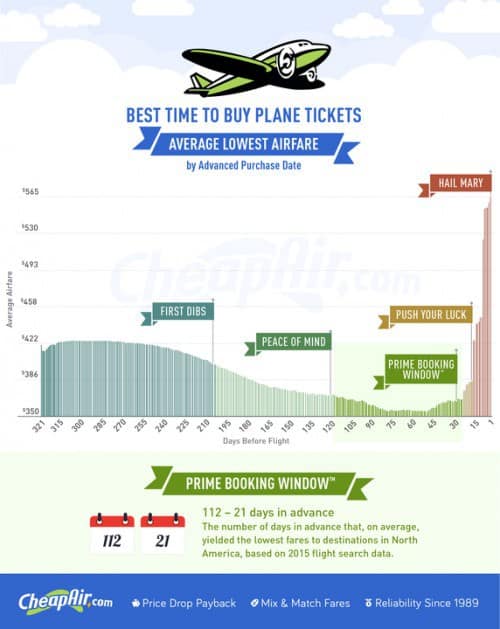
Photo courtesy of cheapair.com
Using discounts
There are three main age groups that can benefit from discounts: children, students and seniors.
People who are travelling with children may not be reading this, but I’ll throw this tip out there just in case. Children often get reduced entry fees at museums, theatres, tours, etc. It would be foolish not to use these discounts if you’re travelling with kids.
As a student, you’re more likely than anyone not to be able to spend a lot of money on travel. You can counter this problem by using the various student discounts that are available all over the world. Just be sure to take a valid student ID card with you (sometimes, even a document that looks like a legit student ID is enough) and you’re good to go.
There is often some kind of discount available for senior citizens as well. These discounts start at ages as early as 50 years old. There are cheaper tariffs available for public transport, nature reserves, airlines, cathedrals, and much more.
Overnight transport
Although taking an overnight bus, train, flight or boat may be a bit more expensive than its daytime equivalent, you won’t have to pay for accommodation. In most cases, that’s still a pretty good deal and a great way to save some money on the road.
You’re going to have to sacrifice your quality of sleep for one night, but that’s nothing compared to the money you’ll save. Just be sure to bring an eye mask, earplugs and a neck pillow.
Well, that was it. You can also read about how to get cheap accommodation as a solo traveller and how to find cheap food and drinks as a solo traveller or you can download my free ebook on cheap solo travel.
Do you have any cheap transport tips for solo travellers that I missed? Let me know in a comment!
Thanks for reading!
-S
PIN IT!
